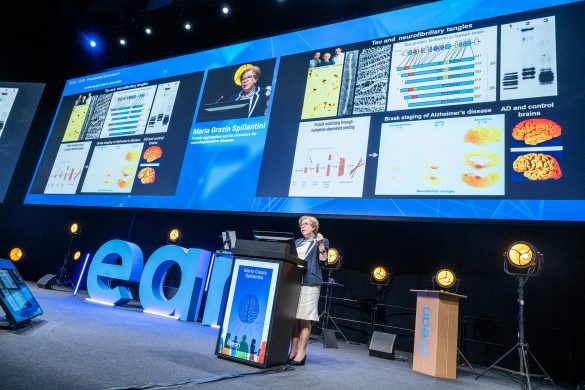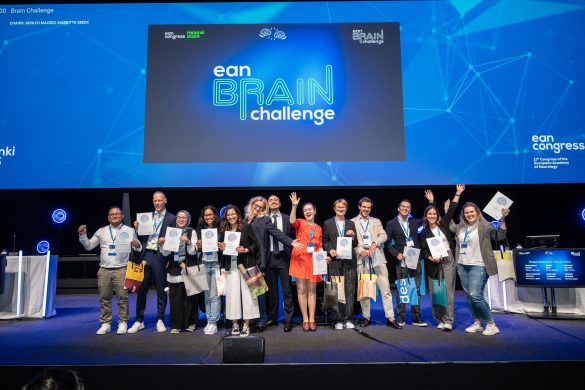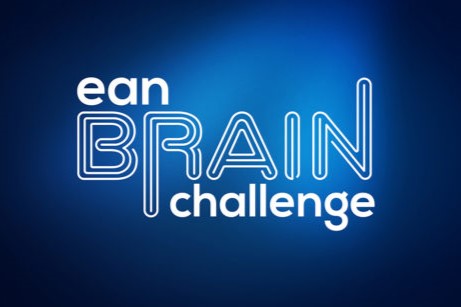
By Elena Moro
For July 2016 we have selected: Effects of aspirin on risk and severity of early recurrent stroke after transient ischaemic attack and ischaemic stroke: time-course analysis of randomized trials. Rothwell PM, Algra A, Chen Z, Diener H-C, Norrving B, Mehta Z. Lancet Neurol 2016 May 18. doi: 10.1016/S0140-6736(16)30468-8.
Whereas there is robust evidence encouraging the use of aspirin for long-term secondary prevention after transient ischaemic attack (TIA) or ischaemic stroke, data supporting aspirin treatment to reduce early recurrence of ischæmic events is weak. Moreover, even less information is available concerning the early aspirin effects on risk or severity recurrence after minor strokes. This is a crucial issue since the risk of recurrent stroke within the week after a TIA or minor stroke is high.
In this systematic review the authors studied the effects of aspirin on risk and severity of early recurrent stroke after TIA and minor stroke. They analyzed individual patient data and original paper records on early outcomes from randomized clinical trials with aspirin versus placebo or anticoagulants, and with aspirin plus dipyridamole versus no dipyridamole in the secondary prevention of vascular events in patients with acute or recent ischaemic stroke or TIA. Several clinical variables were included in the analyses, including the nature of the most recent cerebrovascular event, nature, severity and timing of any recurrent ischaemic event, dose of aspirin, occurrence of acute myocardial infarct and intracerebral hemorrhage. Data were stratified by time from randomization (0-6 weeks, 6-12 weeks, and >12 weeks). The severity of early recurrent strokes was compared between treatment groups evaluating the modified Rankin Scale (mRS) scores with ordinal regression analysis. The possible mechanism of action of aspirin was investigated by analyzing the time course of the interaction between outcomes from aspirin and dipyridamole. Furthermore, the role of aspirin within 48 hours after a major stroke was also evaluated.
Results coming from 9,635 patients in 11 trials of aspirin only versus control showed that aspirin reduced by about 60% the risk of recurrent ischaemic stroke both at 6 and 12 weeks (HR 0.41, 95% CI 0.30-0.56; p<0.0001). Moreover, aspirin decreased also the severity of recurrent stroke by 70% at 6 and 12 weeks, and by 75% the risk of very severe ischaemic stroke (HR 0.25, 0.16-0.39, p<0.0001), but had less effects on non-disabling stroke. The greatest reduction was seen within the first 2 weeks, especially in patients with TIA and minor stroke (HR 0.07, 95% CI 0.02-0.31). Overall, aspirin reduced the early risk of any recurrent stroke, fatal stroke, and acute myocardial infarction up to 12 weeks, but no benefit was found afterward. The effects of aspirin were related mostly to an important reduction in the stroke severity, independently of dose and patient’s characteristics, and were present also in patients with atrial fibrillation at baseline. Compared to control, the risk of intra-cerebral haemorrhage on low-dose aspirin did not vary. Dipyridamole plus aspirin versus aspirin alone showed to reduce the risk of recurrent ischemic event after 12 weeks (0.76, 0.63-0.92, p=0.005), especially disabling or fatal ischaemic stroke. When used to treat acute ischaemic stroke within 48 hours (40,531 participants from 3 trials), the effects of aspirin on the 14-day risk differed in relation to the stroke severity. Its effects were significant in patients with mild neurological deficits at baseline, and considerable by the second day of treatment.
“This study has showed that aspirin reduces the early recurrence of all strokes up to 12 weeks, resulting in 80-90% decrease of disabling or fatal recurrent ischaemic stroke after TIA and minor stroke. To date, these effects have been largely underestimated,” says Prof. Hans-Christoph Diener, Department of Neurology, University Duisburg-Essen, Germany. “These results have several important practical applications in the secondary stroke prevention. Aspirin should be administered as early as possible after a TIA or minor stroke. Since aspirin is largely available, this strategy can be easily applied worldwide even if a TIA is suspected and by the patient himself. It remains to be understood why this important preventive effect is lost after 3 month and to better investigated the potential preventive effects of dipyridamole on stroke prevention in the long-term.”
The other nominees for the July paper of the month are:
- Baharoglu MI, Cordonnier C, Al-Shahi Salman R, et al, for the PATCH Investigators. Platelet transfusion versus standard care after acute stroke due to spontaneous cerebral haemorrhage associated with antiplatelet therapy (PATCH): a randomized, open-label, phase 3 trial. Lancet Neurol 2016 May 10; doi. 10.1016/S0140-6736(16)30392-0.
In this multicenter, open-label, masked-endpoint, randomized trial the authors investigated the role of platelet transfusion on reducing death or dependence after intracerebral hemorrhage associated with antiplatelet treatment use. 93 participants were enrolled assigned to platelet transfusion and 93 to standard care. At 3-month follow-up there were more deaths or dependence in the platelet transfusion group.
- Pitter KL, Tamagno I, Alikhanyan K, et al. Corticosteroids comprise survival in glioblastoma. Brain 2016:139;1458-1471. The authors conducted a retrospective analysis of patients with glioblastoma to assess the prognostic role of steroid administration. Moreover, they used a disease-relevant mouse model of glioblastoma to better study the effects of dexamethasone on tumor cells, together with a murine anti-VEGFA antibody for edema control. Patients review showed that corticosteroid use during radiotherapy was associated with shorter survival. In mice, dexamethasone decreased tumor cell proliferation but reduced survival when associated with radiotherapy. Results suggest that overall steroid treatment may reduce radiotherapy effects and shorten survival.
- Anderson CS, Robinson T, Lindley RI, et al., for the ENCHANTED Investigators and Coordinators. Low-dose versus standard-dose intravenous alteplase in acute ischemic stroke. N Engl J Med 2016 May 10; doi.1056/NEJMo1515510. In this multicenter, prospective, randomized, open-label trial with blinded evaluation the effects of low-dose (0.6 mg/kg, 855 participants) were compared with the standard dose (0.9 mg/kg, 817 participants) in patients with acute ischemic stroke. Similar effects on the modified Rankin Scale scores at 3 months were achieved with both doses. Fewer adverse events were reported in the low-dose group.
- Johnston SC, Amarenco P, Albers GW, et al, for the SOCRATES Steering Committee and Investigators. Ticagrelor versus aspirin in acute stroke or transient ischemic attack. N Engl J Med 2016 May 10. doi. 10.1056/NEJMoa1603060. The effects of ticagrelor versus aspirin for secondary stroke prevention was studied in a multicenter, double-blind, controlled trial involving 13,199 patients with non-severe ischemic stroke or high-risk transient ischemic attack. Patients were randomized to receive either ticagrelor or aspirin within 24 hours after symptoms onset. At the 3-moth end point tocagrelor was not superior to aspirin in reducing the rate of cerebro- and cardio-vascular events.













